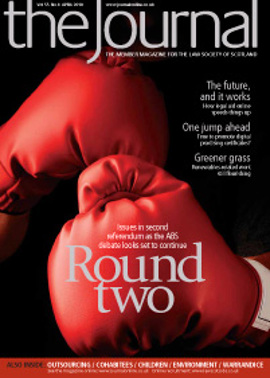It's never too early to call your external solicitor?

When does a communication attract the protection of legal advice privilege, and are in-house lawyers in the same position as solicitors in private practice? The answer seems to be: “it depends”.
In this article the focus is on one of the two limbs of the umbrella description “legal professional privilege” (LPP). First, therefore, the two limbs need to be distinguished. Litigation privilege can extend to communications between a lawyer or the lawyer’s client and a third party, or to any document brought into existence for the dominant purpose of being used in litigation. The justification for litigation privilege is usually expressed in terms of the need to afford privilege to the seeking or giving of legal advice for the purposes of actual or contemplated litigation.
The other limb of LPP is legal advice privilege. The law in this area was clarified by the House of Lords in the 2004 case Three Rivers District Council v Governor and Company of the Bank of England (No 5) [2004] All ER (D) 176. After the collapse of BCCI in July 1991 the Chancellor of the Exchequer announced the Bingham Inquiry into the Bank of England’s supervision of BCCI. The Bank appointed three Bank officials (“the BIU”) to deal with the inquiry. Freshfields were retained by the Bank to advise generally on all dealings of the Bank, its officials and employees with the inquiry. Freshfields and counsel gave BIU much advice as to the preparation and presentation of the Bank’s evidence to the inquiry. Nearly all the Bank’s communications with the inquiry were the subject of extensive advice from Freshfields and counsel.
The Bingham Inquiry report was published in October 1992. In 1993 some 6,231 persons sued the Bank of England for losses caused by the BCCI collapse. Section 1(4) of the Banking Act 1987 in effect required the claimants to prove bad faith. Not surprisingly they sought the widest possible discovery from the Bank. In particular the claimants wanted documents prepared by employees of the Bank for the purpose of being passed to Freshfields. The Bank withheld these on the ground of legal advice privilege. So the status of documents prepared by Bank employees for external solicitors rather than the bank’s in-house solicitors was in question.
Disclosure with confidence
The claimants argued that only communications between solicitor and client, and evidence of the content of such communications, were privileged. Preparatory materials obtained before such communications, even if prepared for the dominant purpose of being shown to a client’s solicitor, or even if prepared at the solicitor’s request and even if subsequently sent to the solicitor, did not come within the privilege.
The Bank argued that, as a matter of general principle, any document prepared with the dominant purpose of obtaining the solicitor’s advice upon it came within the ambit of the privilege, whether or not it was actually communicated to the solicitor.
The Court of Appeal held that the only documents for which legal professional privilege could be claimed were communications between the BIU and Freshfields seeking or giving legal advice. The BIU, and no one else, was to be treated as Freshfields’ client for privilege purposes.
Some documents were then produced but many were withheld. This led to further litigation: Three Rivers (No 6) [2004] QB 916. The Court of Appeal was asked to rule again. It held that for legal advice privilege to attach, the advice being sought from the lawyer must be advice as to legal rights or liabilities. Crucially, advice as to how the Bank should present its case in the most favourable light did not qualify for privilege. The Bank appealed to the House of Lords.
The Lords agreed with the Bank and approved the following passage from Jones v Smith [1999] 1 SCR 455, Supreme Court of Canada: “Clients seeking advice must be able to speak freely to their lawyers secure in the knowledge that what they say will not be divulged without their consent. The privilege is essential if sound legal advice is to be given. Family secrets, company secrets, personal foibles and indiscretions all must on occasion be revealed to the lawyer by the client”.
In Balabel v Air India [1988] 1 Ch 317 Taylor LJ (as he then was) said that for the purposes of attracting legal advice privilege: “legal advice is not confined to telling the client the law; it must include advice as to what should prudently and sensibly be done in the relevant legal context” (p 330).
The Lords also approved the “relevant legal context” test, stating that the preparation of the evidence to be submitted and the submissions to be made to the inquiry on behalf of the Bank were for the purpose of enhancing the Bank’s prospects of persuading the inquiry that its discharge of its public law obligations under the Banking Acts in relation to BCCI was not deserving of criticism and had been reasonable in the circumstances. Presentational advice given by Freshfields and counsel for that purpose was advice “as to what should prudently and sensibly be done in the relevant legal context”. The “relevant legal context” was the Bingham Inquiry and the question whether the Bank had properly discharged its public law duties under the Banking Acts. So presentational advice fell within the policy reasons underlying legal advice privilege.
HMRC, solicitors and accountants
In a judgment dated 14 October 2009, the High Court of England & Wales held in R (on the application of Prudential plc & Another) v Special Commissioner of Income Tax & Another [2009] EWHC 2494 (Admin) that legal advice privilege applies only to legal advice given by a lawyer, and not for example to tax law advice given by a non-lawyer such as an accountant.
The decision is expected to be appealed. The result appears to be that taxpayers who receive advice on tax law from accountants and other non-lawyers have less protection than those receiving advice from lawyers, because the lawyers’ advice is protected by legal advice privilege whereas the non-lawyers’ advice is vulnerable to disclosure.
That perhaps is an interesting spin on the alternative business structures (ABS) debate, since on the face of it a client being advised by two professionals within the same firm comprising accountants and lawyers might be able to assert legal advice privilege in relation to one set of advice but not the other. And if emails are being copied amongst recipients, HMRC might have at their disposal a waiver of privilege argument, or conversely the client may be able to argue that since a lawyer is being copied in, the communication to all the recipients is privileged. Meantime HMRC are said to be upset that certain law firms appear actively to be encouraging clients not to use non-lawyers for tax advice. The judge, Charles J, added further spice to the occasion by suggesting that as between solicitors and accountants a “level playing field” could be created by removing legal advice privilege entirely…
European Commission investigations
The message here must be “watch this space”.
At EU level, legal privilege in competition cases is important because it allows companies to undertake antitrust compliance programmes. A distinct EU law of professional privilege has grown up. Unfortunately this seems much narrower in scope than legal advice privilege. Matters were not much helped when on 17 September 2007 the EU’s second highest court, the Court of First Instance, upheld the narrow view in relation to documents seized in the context of EU competition cases: Akzo Nobel Chemicals Ltd and Akcros Chemicals Ltd v Commission [2007] EUECJ T-125/03. In particular, the court declined to extend legal privilege in EU competition cases to in-house counsel. The CFI also declined an invitation to extend legal professional privilege to external lawyers who were not members of a bar or law society in an EU member state, on the grounds that this was not relevant to the case in hand.
Consequently, with the Commission (and some European regulators) excluding in-house counsel from the scope of the privilege, companies must exercise great caution when communicating with their legal staff, about EU competition matters for example.
The question of whether legal professional privilege attaches to advice given by in-house counsel was re-examined by the 13-judge panel of the Grand Chamber of the ECJ on 9 February 2010. The Advocate General’s opinion is due on 29 April. The case (C-550/07) is an appeal against the above mentioned judgment of the Court of First Instance in Akzo Nobel. The General Court adhered to the reasoning in the 1982 decision of the Court of Justice in AM & S v Commission (Case 155/79), holding, amongst other things, that the advice of in-house counsel is not covered by privilege, since in-house counsel “lack a sufficient level of independence” by virtue of employee status. This despite the fact that CCBE, the American Corporate Counsel Association (European Chapter), Law Society (E & W) and International Bar Association all argued that, given the strict codes of ethics which all lawyers had to adhere to and which could be enforced against them, all lawyers who were members of a bar should be covered by the privilege.
The Akzo Nobel decision leaves in-house lawyers with a lesser degree of certainty as to which communings are protected, compared to their fellows in private practice. The 29 April 2010 should be interesting.
- Paul Motion is a partner and solicitor advocate with BTO Solicitors based in Edinburgh. This article derives from a paper delivered to the In-house Lawyers Group.
In this issue
- Islamic law - the beginnings
- Depriving criminals of their ill-gotten gains: is it happening?
- Burdening the legal aid lawyer
- Landlord's hypothec: the permutations
- Time to push for Gill
- Plus ça change, plus c'est la même chose
- Seconds out
- Help at hand
- Win-win situation
- Giving and taking away
- Home and away
- Quest for power
- A crumbling monument?
- No happy ending
- Seminars target money laundering awareness
- DP/FOI specialism opens to applicants
- Law reform update
- Points of access
- Diploma or not?
- From the Brussels Office
- Are you who you say you are?
- Ask Ash
- Social media: a revolution
- A commercial approach
- Growth industry
- Price of success
- Variations: some more thoughts
- Tenancy or bust
- Another nibble of the cherry
- Planning with add-ons
- Website review
- Scottish Solicitors' Discipline Tribunal
- Book reviews
- It's never too early to call your external solicitor?
- Dereliction of duty?
- To grant or not to grant?






